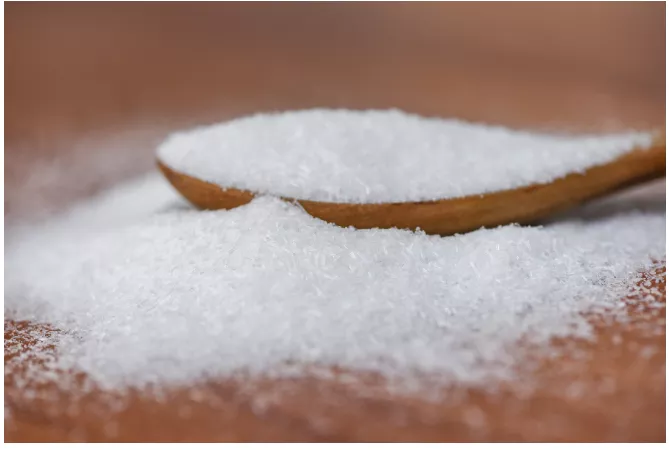Is Monosodium Glutamate MSG Gluten-Free?

Monosodium glutamate, also known as MSG is a very commonly used food additive utilized in several industrially produced and hot-cooked food items. The powdered msg food additive is used for enhancing the flavor of foods, particularly those that require an umami flavor. But is this additive gluten free? Let’s find out.
What is the monosodium glutamate?
Monosodium glutamate msg has long been a staple ingredient used in regional Asian cuisines. However, it is now used worldwide for the preparation of foods as well as for packaged snacks and other food products. It is mostly found in the form of msg powder, which can be utilized for making a range of foods including broths, ketchups, soups, and snacks, and is also widely known as sodium glutamate.
Within the food industry msg is used not just as a flavor enhancing food additive, but it is also utilized as a part replacement of salt since this is also a sodium salt. Though manufactured artificially on a large scale for bulk usage, msg is also found naturally in some foods. Common examples of monosodium glutamate foods include fish, nuts, corn, dairy products, cheese as well as tomatoes, clarifying a very commonly raised query ‘Is msg natural flavor’.
Is monosodium glutamate MSG bad?
There has been a widely spread misconception that eating msg for foods with msg is bad for you as it can cause problems like headaches. This issue was also termed as the ‘Chinese restaurant syndrome’, however, there is no proof that when consumed within permitted limits, that msg seasoning is bad for you.
Within the US, there have been multiple blinded studies conducted that have revealed that msg products are not related to any of the headache symptoms that people believed them to cause. In fact, even when produced artificially, msg is considered safe for consumption as the salt has been categorized as safe for consumption by the US FDA and WHO. The European Union has also classified msg as a safe and permitted additive for foods when added in regulated quantities with the number E621 food additives code.
But if the question of is msg healthy arises, there is also no proof of that. The product is only useful as a seasoning which can be added to food to enhance its flavor and bring out the umami profile. It, as such, has no health benefits, and causes no challenges, when consumed in limited quantities.

What is the controversy with monosodium glutamate?
Founded in 1907 by Kikunae Ikeda, a prominent Japanese biochemist, when trying to mimic the umami flavor of seaweed, Msg quickly became a popular chemical that was used to improve flavor of varied dishes. Cooking with monosodium glutamate became a common practice around Asian countries, and it also came to be known in the Western world where the chemical was now used in a variety of packed foods including baby foods.
Monosodium glutamate in food quickly became popular globally, particularly being used in Chinese restaurants worldwide. The cuisine which was considered ‘exotic’ by the locals, soon became a topic of bias around the 1950s-1960s.
This happened because of certain publications about chemicals in food products leading people to largely start worrying about any kinds of chemicals in their foods. It was widely known that msg in food is common in Chinese cuisine, and a few people started to report feeling headaches, and other uncomfortable symptoms.
Doctors too, began blaming msg as the potential culprit behind these issues, leading to a widespread concern around its consumption, even prevalent today. However, studies revealed that these feelings could also be a placebo effect, as people generally understood that foods with monosodium glutamate can cause such issues, despite there being no proof of it.
Many scholars understood it to be a kind of racism, especially because several studies, where people were fed food that contained msg without them knowing that it had the chemical in it, did not feel any of the symptoms that they previously claimed. However, those with this knowledge (even if the food did not contain msg) claimed that they suffered the same issues.
Is monosodium glutamate free?
Very often, the question of whether msg contains gluten pops up from people who are conscious of their diet and do not consume gluten. Those who are on a gluten-free diet or have gluten allergies can consume food containing msg as msg and gluten are not related. Although the production of msg can utilize starches and sugars, even at times wheat starch, the end product monosodium glutamate is gluten-free.
As such, gluten-free products that contain monosodium glutamate e621, or any other form of msg food additive are safe to consume. Manufacturers of these foods can also rest assured that if the only point of concern is monosodium glutamate e number, they can classify their foods as gluten-free.
For manufacturers, however, it is essential to find a reliable monosodium glutamate supplier when they buy msg to ensure that the quality of the product is pure, especially with the concerns around its safety continuing to float around.

Some of the most popular brands that are reliable include Ajinomoto monosodium glutamate, Meihua monosodium glutamate, and Fufeng monosodium glutamate. These brands offer the best msg of high quality and purity. When searching for options on where to buy msg, these brands can be your top choice.
If you are looking for options to buy monosodium glutamate, you should also check out Mondstar, a prominent supplier of msg. This e621 flavor enhancer is supplied worldwide to leading brands and food manufacturers by Mondstar, and the firm has been a trusted partner in this segment for many years. To know how you can buy msg and other food additives, connect with Mondstar today!
Related Posts:
1. what is sodium benzoate used for?
2. Artificial sweetener Sodium Cyclamate
